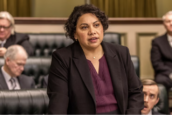
The Uniting Church and Lay Presidency
The Uniting Church has a firm commitment to being part of the one, holy, catholic and apostolic church. This is affirmed in our Basis of Union as well as in many places in liturgies and papers written on various topics.
Belonging to this body, along with many other denominations—Orthodox, Roman Catholic, Anglican, Baptist, Church of Christ, Presbyterian, Pentecostal, and others—means that we seek to find the things in common, that we hold across the denominations. As members of that one body, we share many beliefs, practices, customs and commitments.
From time to time, however, one of those denominations will make a decision or implement a policy that sets it apart, in some, from the others. This process of differentiation is perfectly normal and quite understandable. Human beings are all different from one another. We have many things in common, but some things that set us apart as different.
The matter of presiding at the sacraments is one such case in point. For twenty-five years, now, the Uniting Church has authorised lay people to preside at the sacraments. In many denominations, this role is the preserve of the clergy who have been ordained, set apart for a priestly role, which includes presiding at the sacraments. So, for the Uniting Church to introduce the practice of authorising lay people to undertake this role, is a distinctive feature.
Of course, there are other practices within the Uniting Church which differentiate us from other members of the one, holy, catholic and apostolic church. Ordaining women is one such practice; it is not done in many denominations around the world. Permitting ministers to be married is another; some denominations do not have such a practice. The ordaining of a person to the ministry of Deacon, a ministry that is equal in status and equivalent in function alongside the Minister of the Word, is another Uniting Church distinctive.
Despite these distinctive, we still maintain cordial and respectful relationships with other denominations where those practices are not found. We recognise that it is possible to be different within the one body. Diversity is not division, and unity is not uniformity. We co-exist in our diversity within unity.
We need also to note that, within the Uniting Church, authorising lay people to preside at the Sacraments is understood as being faithful to our commitment in the Basis of Union. In that document, the church affirms that the one Spirit has endowed the members of Christ’s Church with a diversity of gifts, and then declares that the Uniting Church will … provide for the exercise by men and women of the gifts God bestows upon them (Basis of Union para 13). Leading a gathering of faithful people in a celebration of one of the sacraments of the church is one such gifting, for which appropriate provision has been made.
Four four days over the last two months, Elizabeth and I have been working with a group of lay leaders from across our Presbytery as they prepare to fulfil this ministry within the community of faith where they worship and serve. It is always an inspiring opportunity, to work with committed people who are equipping themselves for new forms of service.
We take four days, across two weekends, to explore the Biblical passages relevant to the two sacraments of Baptism and Holy Communion, as well as the relevant paragraphs from the Basis of Union, which sets out the theological understandings held by the church in relation to these sacraments.
We spend some time exploring the structure of the liturgy for worship in Sunday services, where each sacrament “fits” within that structure, and what the component parts of each sacrament are. We look at the role of symbols, in life in general, and in worship in particular, and explore the various symbolisms inherent in each sacrament.
There are case studies and role plays included in the resources for the group to use. This helps participants to “get inside” the role of Lay Presider, both in the worship itself, and in the times of preparation for each sacrament, such as the pre-Baptism interview with candidates or parents of the child to be baptised.
We spend each Sunday morning attending the worship of a local congregation within the Presbytery, where Holy Communion is being celebrated. This gives participants an opportunity to experience worship led by an experienced minister (either ordained or lay), and then to reflect on the experience with critical insight.
Finally, there is a session for each sacrament devoted to the various practical considerations associated with each sacrament. Each member of the class takes a turn in leading a part of the liturgy, and we discuss matters such as voice projection, eye contact with the congregation, gestures, actions integral to the worship, and so on.
To complete the requirements of the course, participants seeking to become lay presieers must submit four written assignments followed by the conducting of a service with supervisory assessment of the candidate by an experienced Minister or Lay Presider.
In undertaking this course, we demonstrate the way that the Uniting Church works. Every one of the four councils of the church plays a role. We follow the national Assembly guidelines for Lay Presiders, using the educational resources provided by the Synod. The Presbytery (the regional body) offers the training. The local Church Council designates the candidate(s) for this ministry, who must share in the pastoral oversight of the congregation or faith community, and requests the Presbytery to approve them once they have completed their assignments.
The final step is for the Presbytery to approve for the conduct of Sacraments by the authorised Lay Presider within the designated congregation. Authorisation is for a designated period of time, and must be reviewed before it can be renewed, if appropriate, at a later time.
The process is relatively slow and complex, but that is to ensure that not just anybody can perform this role; those who do so must be recognised as gifted for the role, then trained and equipped for the role, before they are authorised.
In part, this is because the Uniting Church takes seriously the process of appropriate equipping people for ministry. In part, it is because of our ecumenical commitments, and sensitivities to how presiding at the Sacraments is understood and practised in other denominations within the one, holy, catholic and apostolic church.
And that is something for which, I believe, we ought to be most grateful.
The photo shows participants in the course, Understanding the Sacraments, held mid-2019 in the Canberra Region Presbytery.
You can read the Assembly guidelines on lay presidency here.
Rev. Dr John Squires was formerly Principal of Perth Theological Hall. He is currently undertaking an Intentional Interim Ministry with Queanbeyan Uniting Church.
This article originally appeared on his blog, An Informed Faith.
- Categories: Belief Matters, Features, News



























































